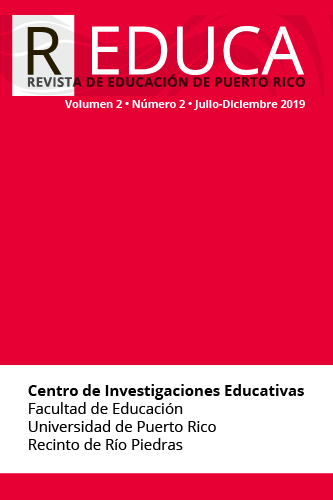Abstract
This article presents the findings of an action research, which purpose was to explore how participating on a reading club positively contributes to the development of aesthetic reading (reading for pleasure) in elementary school students that showed challenges with reading and were participants on an RTI literacy development group. The techniques used to collect the information were a pre-test, a questionnaire, three journal entries, a post-test and the participation on a focus group. The research was based on the constructivist approach to education which is based on learning through personal construction of meaning. Reading is seen as an activity of transactional interaction between the reader and the text, as proposed by Rosenblatt (1995). Among the most significant findings, we saw that the integration of snacks, dramatizations, book loans and enriched activities surrounding the shared readings brought satisfaction, enjoyment and participation to the students.
References
Álvarez, C. (2010). Un club de lectura para mayores y pequeños. Cuadernos de Pedagogía, 402, 28-30.
Álvarez, C. & Gutiérrez, R. (2013). Educar en valores a través de un club de lectura escolar: Un estudio de caso. Revista Complutense en Educación, 24(2), 303-319.
Álvarez- Álvarez, C., & Pascual-Díez, J. (2014). Aportaciones de un club de lectura escolar a la lectura por placer. El Profesional de la Información, 23(6), 625-631.
Cambourne, B. & Turbill J. (Eds). (1994). Responsive evaluation: Making valid judments about student literacy. Portsmouth, NH: Heinemann.
Creswell, J. (2014). Research design: Qualitative, quantitative and mixed methods approaches (4ta ed.). Thousand Oaks, Londres, Nueva Delhi, Singapur: Sage Publications.
Deuschle, K. (2017). Using parent book clubs to build a school wide Reading community. Knowledge Quest, 46(2), 16-20.
Farrell, E. & Squire, J. (1990). Transactions with literature: A fifty-year perspective. Urbana, IL: National Council of Teachers of English.
Fountas, I. C. & Pinnell, G. S. (2012). Sistema de la evaluación de lectura K-2 de Fountas & Pinell. Portsmouth, NH: Heinemann.
Goodman, K. (2006). Sobre la lectura: Una mirada de sentido común a la naturaleza del lenguaje y la ciencia de la lectura. México, D. F.: Editorial Paidós.
González Robles, A. (2011). Creating spaces for critical literacy within a Puerto Rican elementary classroom: An ideological model of literature discussions. (Tesis doctoral inédita). Universidad de Arizona, Tucson, Estados Unidos. (UMI No. 11654)
Goodman, K. (1989). Lenguaje integral. Mérida, Venezuela: Editorial Venezolana.
Guerreros Garzón, D., Torres Ceballos, J. & Restrepo Micán, L. A. (2006). Estrategias pedagógicas para niños y niñas de 3 a 5 años. (Tesis de Maestría). Universidad de la Sabana, Facultad de Educación, Cundinamarca, Colombia. Recuperado de https://intellectum.unisabana.edu.co/bitstream/handle/10818/1576/121737.pdf?sequence=1&isAllowed=y
Jiménez, F. (2005). Clubes de lectura: Una lectura oculta. Portal Iberoamericano de Gestión Cultural. Recuperado de http://www.gestioncultural.org/ficheros/1_1317289038_bgc13-FJimenezGuerra.pdf
Kasza, K. (1991). El día de campo de Don Chancho. Colombia: Editorial Norma.
Lucca Irizarry, N. & Berríos Rivera, R. (2009). Investigación cualitativa: Fundamentos, diseños estrategias. Cataño, PR: Ediciones SM.
Melgarejo, X. (2016). ¿Por qué Finlandia es líder en comprensión Lectora? Ponencia presentada en el Congreso Internacional del Comprensión Lectora Infantil y Primaria (en línea). Recuperado de http://relatosenconstruccion.com/lecturas-sonoras/xavier-melgarejo-comprension-finlandia/
Morales, A. & Arbe, U. (2013). Una experiencia docente sobre la lectura compartida, la lectura por placer y las TICS como medio de comunicación y creatividad: Club de Lectores. Psicología Educativa, 19, 123-126.
Ramírez, E. (2016). De la promoción de la lectura por placer a la formación integral de lectores. Investigación Bibliotecológica, 3(69), 95-120.
Rosen, M. (2003). Vamos a cazar un oso. (V. Uribe, Trad.; H. Oxenbury, Ilustradora). España: Ediciones Ekaré.
Rosenblatt, L. (1978). The reader, the text and the poem: The Transactional Theory of the Literary Work. Carbondale, IL: Southern Illinois University Press.
Rosenblatt, L. (1988). Writing and reading: The transactional theory. Champaign, IL: Center for the Study of Reading, University of Illinois at Urbana-Champaign. Recuperado de: https://www.ideals.illinois.edu/bitstream/handle/2142/18044/ctrstreadtechrepv01988i00416_opt.pdf?sequence=1&isAllowed=y
Rosenblatt, L. M. (1995). Literature as exploration (5ta ed.). Nueva York, NY: The Modern Language Association.
Rosenblatt, L. (2002). La literatura como exploración. México: Fondo de Cultura Económica.
Rosenblatt, L. (2005). Making meaning with texts. Selected essays. Portsmouth, NH: Heinemann.
Ruiz, D. (1996). La alfabetización temprana en el ambiente preescolar. Río Piedras, PR: Universidad de Puerto Rico.
Sáez Vega, R. J. & González Robles, A. E. (Comps.). (2015). En voces de maestras: La transformación de prácticas educativas hacia la pedagogía del lenguaje integral. San Juan, PR: Centro para el Estudio de la Lectura, la Escritura y la Literatura Infantil (CELELI).
Stringer, E. (2014). Action research (4ta ed.). Los Angeles, CA: Sage Publications.
Vygotsky, L. (1962). Thought and language. (E. Hanfmann & G. Vakar, Trads.). Cambridge, MA: The MIT Press.
The contents published in the Puerto Rico Journal of Education is freely distributed under open access practices, in accordance with the Creative Commons license, Attribution-NonCommercial 4.0 International (CC BY-NC 4.0). Through these principles, the journal and its authors allow readers to access, reproduce and share articles in full text. Users should give credit to authors in a reasonable way without suggesting they have their support. Under no circumstances, readers may make use of the contents for commercial purposes. The authors retain copyright on their works.

